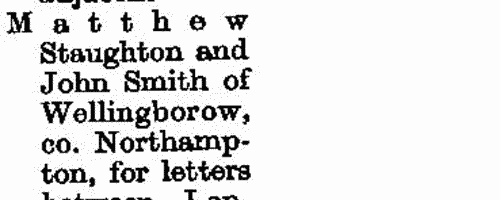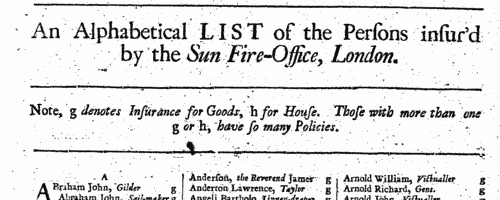Finkell Surname Ancestry ResultsOur indexes 1000-1999 include entries for the spelling 'finkell'. In the period you have requested, we have the following 13 records (displaying 1 to 10): Buy all | | | Get all 13 records to view, to save and print for £76.00 |
These sample scans are from the original record. You will get scans of the full pages or articles where the surname you searched for has been found. Your web browser may prevent the sample windows from opening; in this case please change your browser settings to allow pop-up windows from this site. Hertfordshire Sessions
(1581-1700)
Incidents from the Hertfordshire Sessions Rolls. These cover a wide range of criminal and civil business for the county, with presentments, petitions, and recognizances to appear as witnesses: many of the records concern the county authorities dealing with regulation of alehouses, religious conventicles, absence from church, highways, poaching, profanation of the Sabbath, exercising trades without due apprenticeship &c. Unlike the Sessions Books, the decisions of the justices are not recorded on the rolls, which serve more as a record of evidence and allegations. Where the date of a roll is given with an asterisk, it indicates that that particular document was not then in the county muniments, but in the archives of the Marquess of Salisbury (whose ancestors had served as Custos Rotulorum) at Hatfield House. This is a calendar of abstracts of extracts: it is by no means a completely comprehensive record of the surviving Hertfordshire sessions rolls of the period, but coverage is good. FINKELL. Cost: £4.00.  | Sample scan, click to enlarge

| Treasury Books
(1704-1705)
Records of the Treasury administration in Britain, America and the colonies, for January 1704 to March 1705. The text covers a huge variety of topics involving all manner of receipts and expenditure, customs and revenue officials, civil servants, pensioners, petitioners and postmasters figuring particularly among the individuals named.
FINKELL. Cost: £4.00.  | Sample scan, click to enlarge

| Treasury and Customs Officials, Officers and Pensioners
(1711)
Government accounts, with details of income and expenditure in Britain, America and the colonies
FINKELL. Cost: £6.00.  | Sample scan, click to enlarge

| Persons Insured by the Sun Fire Office, London
(1714)
This list of the persons insured by the Sun Fire Office, London, gives full name (surname first), occupation (in italics), and the letter g (for goods) or h (for house) indicating the nature of their policy. Those with more than one g or h, have so many policies. An appendix lists those entered since, and omitted in printing the list, which was published in instalments from February to March 1714.FINKELL. Cost: £6.00.  | Sample scan, click to enlarge

|  Masters and Apprentices
(1721) Masters and Apprentices
(1721)
Apprenticeship indentures and clerks' articles were subject to a 6d or 12d per pound stamp duty: the registers of the payments usually give the master's trade, address, and occupation, and the apprentice's father's name and address, as well as details of the date and length of the apprenticeship. 2 January to 26 August 1721.FINKELL. Cost: £8.00.  | Sample scan, click to enlarge

|  Masters and Apprentices
(1723) Masters and Apprentices
(1723)
Apprenticeship indentures and clerks' articles were subject to a 6d or 12d per pound stamp duty: the registers of the payments usually give the master's trade, address, and occupation, and the apprentice's father's name and address, as well as details of the date and length of the apprenticeship. 7 January to 31 December 1723.FINKELL. Cost: £8.00.  | Sample scan, click to enlarge

|  Masters of clerks and apprentices
(1763) Masters of clerks and apprentices
(1763)
Apprenticeship indentures and clerks' articles were subject to a 6d or 12d per pound stamp duty (late payment of the 6d rate attracted double duty (D D) of 12d): the registers of the payments usually give the master's trade, address, and occupation, and the apprentice's name, as well as details of the date and length of the apprenticeship. 1 January to 9 December 1763.FINKELL. Cost: £8.00.  | Sample scan, click to enlarge

| Cambridgeshire Voters: Haslingfield
(1832)
The poll on the election of three knights of the shire to serve in Parliament for the county of Cambridge, was taken at Cambridge, Royston, Newmarket, Ely, Wisbech and Whittlesea 18 and 19 December 1832. The candidates were Henry John Adeane esquire, Richard Greaves Townley esquire, Charles Philip Yorke esquire and John Walbanke Childers esquire. This poll book sets out the names of the voters in alphabetical order hundred by hundred and parish by parish. The voters' full names are stated, surname first. The right hand column records their votes. The new qualification for suffrage in the counties, after the passage of the 1832 Great Reform Bill, was the possession of a freehold estate worth 40s a year or more, a copyhold or long leasehold of £10 a year or more, or a tenancy or short leasehold of £50 a year or more.
FINKELL. Cost: £6.00.  | Sample scan, click to enlarge

| Cambridgeshire Voters: Steeple Morden
(1832)
The poll on the election of three knights of the shire to serve in Parliament for the county of Cambridge, was taken at Cambridge, Royston, Newmarket, Ely, Wisbech and Whittlesea 18 and 19 December 1832. The candidates were Henry John Adeane esquire, Richard Greaves Townley esquire, Charles Philip Yorke esquire and John Walbanke Childers esquire. This poll book sets out the names of the voters in alphabetical order hundred by hundred and parish by parish. The voters' full names are stated, surname first. The right hand column records their votes. The new qualification for suffrage in the counties, after the passage of the 1832 Great Reform Bill, was the possession of a freehold estate worth 40s a year or more, a copyhold or long leasehold of £10 a year or more, or a tenancy or short leasehold of £50 a year or more.
FINKELL. Cost: £6.00.  | Sample scan, click to enlarge

|  Persons of standing recommending London police recruits
(1843-1857) Persons of standing recommending London police recruits
(1843-1857)
The Metropolitan Police Register of Joiners (MEPO 4/334) lists policemen joining the force 1 January 1843 to 1 April 1857 (warrant numbers 19893 to 35804). The register is alphabetical, in so far as the recruits are listed chronologically grouped under first letter of surname. It gives Date of Appointment, Name, Number of Warrant, Cause of Removal from Force (resigned, dismissed, promoted or died), and Date of Removal. Although the register was closed for new entrants at the end of 1842, the details of removals were always recorded, some being twenty or more years later. Those recruits not formerly in the police, the army, or some government department, were required to provide (normally) at least two letters of recommendation from persons of standing, and details of these are entered on the facing pages. Where a recruit was only recently arrived in the metropolis, the names and addresses of the recommenders can be invaluable for tracing where he came from. Those recruits not formerly in the police, the army, or some government department, were required to provide (normally) at least two letters of recommendation from persons of standing, and details of these are entered on the facing pages: the names in these are indexed here (the police recruits are indexed separately and not included here). Recruits transferred from other forces or rejoining the force did not normally need recommendations - in the latter case, former warrant numbers are given - but some recommendations are from police inspectors, even other constables. Recruits coming from the army sometimes have general military certificates of good conduct, but most often have a letter from their former commanding officer; recruits recommended by government departments (most often the Home Office) similarly have letters from the head of department. But the great majority of the names and addresses in these pages are of respectable citizens having some sort of personal acquaintance with the recruit. Where more than two recommendations were provided, the clerk would only record one or two, with the words 'and others'. Tradesmen are sometimes identified as such by their occupations; there are some gentry. Although the bulk of these names are from London and the home counties, a scattering are from further afield throughout Britain and Ireland. FINKELL. Cost: £8.00.  | Sample scan, click to enlarge

|
| 1 | 2 |  |
Research your ancestry, family history, genealogy and one-name study by direct access to original records and archives indexed by surname.
|













